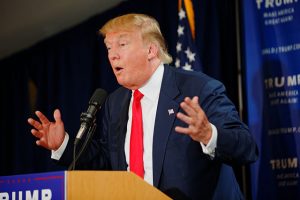by John Feffer
When it comes to the Russiagate scandal, progressives usually take one of two positions.
They either dismiss the scandal as a lot of hooey, a “nothingburger,” just a way for warmongers and the “Deep State” to revive a cold war between Washington and Moscow. Or they treat the scandal as just a means to an end, a way to cast doubt on the 2016 presidential election, implicate the administration in a variety of crimes, and ultimately impeach the president.
Both of these positions are wrong.
I last wrote about the perplexing positions of some progressives on Russia back in March 2015, long before the Russiagate scandal and the 2016 elections. At the time, I was trying to understand why some progressives were bending over backwards to excuse the actions of Russian President Vladimir Putin, both domestically (his authoritarianism) and externally (his meddling along the periphery of Russia and further afield in Syria).
Putin, I argued, was an autocrat, an anti-progressive nationalist, and an imperialist wannabe. By all means, the United States should negotiate treaties with Russia and avoid a resurgent cold war, I maintained, but progressives should have no illusions about the nature of the current wielder of power in the Kremlin.
What had once been a strange sideshow of geopolitics has now, with the election of Donald Trump, become the main act. And the bizarre overlap in positions between some elements of the left and the right about Russiagate does not bode well for the future of American politics.
The stakes, in other words, are far greater than the fate of the current president of the United States. Why focus on Russiagate when we face possible nuclear war in Korea, a slow-motion apocalypse through climate change, and growing economic inequality worldwide? Because Russiagate points to a new kind of politics, in the United States and elsewhere, that makes resolution of these crises increasingly difficult.
Yes, the U.S. status quo before Russiagate was grossly unfair. The future status quo, a world of continuous Russiagates, will be grossly unfair and authoritarian as well.
Addressing the Skeptics
The Russia scandal has scrambled the political spectrum. Consider the case of Glenn Greenwald, the journalist based in Brazil who writes for The Intercept.
Greenwald has emerged as one of the prominent skeptics of the investigation into collaboration between the Trump campaign and the Russians. Once a fixture in the progressive media for his dissection of the national security state, he is now more frequently cited by the far right in its efforts to discredit the investigation run by Robert Mueller. The journalist used to chat regularly with MSNBC’s Rachel Maddow, but now he’s more likely to appear with Tucker Carlson on Fox News.
“I used to be really good friends with Rachel Maddow,” Greenwald told New York magazine. “And I’ve seen her devolution from this really interesting, really smart, independent thinker into this utterly scripted, intellectually dishonest, partisan hack.”
Wow, that’s harsh.
Greenwald is not alone. You can find skeptical articles about Russiagate at The Nation, Counterpunch, Consortium News, and many other progressive outlets. And these articles can be equally scathing about the journalists, mainstream or otherwise, that take the investigation seriously.
Over at The Nation, Russia specialist Stephen Cohen regularly challenges the emerging narrative, most recently suggesting that the intelligence community essentially fabricated Russiagate, which has generated in turn a different scandal — he calls it “Intelgate” — even larger than Watergate.
I cut my Sovietology teeth on Stephen Cohen and have always had tremendous respect for him. I certainly understand his desire to counter the demonization of all things Russian and his skepticism of the organs of U.S. national security. But he seems to have lost sight of the fact that the two principal groups of actors in this saga — the Trump team and the Putin people — are ruthless operators who have imported their mafia style into democratic politics.
Remember: The enemy of my enemy, even if that enemy is the U.S. national security state, is not necessarily my friend!
Consortium News, meanwhile, likes to give voice to former intelligence operatives. For example, former CIA analyst Philip Giraldi accepts the charges in the recent Nunes memo at face value and asserts that Israel, not Russia, played a much more prominent role in determining the 2016 election. Former CIA analyst Ray McGovern, also at Consortium News, believes that he can prove that the FBI, on behalf of the “Deep State,” is out to get the Trump administration.
But really it’s the same old material that Fox News has been trumpeting. I suppose it takes one to know one, but I suspect these former operatives have other axes to grind in this fight. Hell hath no fury like an intelligence operative scorned.
At Counterpunch, meanwhile, political economist Rob Urie argues that Russian involvement in the 2016 election is a “red herring” because, essentially, it has not been proven that any voter changed his or her mind as a result of Russian influence. Oh, and there isn’t any proof anyway of Russian meddling — or, if there is “proof,” it comes from unreliable sources. And if Russia engaged in such meddling, it had good reason to do so, given U.S. foreign policy maneuvers in Ukraine and elsewhere.
There’s a lot here to parse (which I will do below). But let’s return to Greenwald, because his perch at The Intercept is so influential.
Most of the time, Greenwald has delighted in revealing what the mainstream media has gotten wrong on the Russia story. In September, he ridiculed reports of Russian hacking of 21 state election systems, which turned out to be, in some cases, misreported. But some overly hasty conclusions don’t entirely discredit the entire story. The Department of Homeland Security first mentioned the attempted hacks in June 2017 but noted that it did not affect any votes. Again, this month, the head of cybersecurity for DHS, Jeanette Manfra, repeated the same claim.
Perhaps DHS is continuing to engage in disinformation. But Greenwald didn’t bother to write anything about Illinois, the one specific and rather well-documented case of Russian hacking that did manage to penetrate a state system (again without having any impact on the election results).
Also escaping his scrutiny have been the reports I mentioned in last week’s column: Dutch surveillance of Cozy Bear in Moscow as the operation hacked into the Democratic National Committee and the trial in Russia of a hacker who described receiving orders from the Russian Federal Security Service (FSB) “to attack the DNC’s servers for the purpose of manipulating the U.S. electoral process.”
Okay, so the U.S. media has made mistakes in its coverage of Russiagate. It’s not exactly a transparent story. And it’s very useful for journalists to keep other journalists honest (not to mention government officials).
But Greenwald is after something different. He is out to discredit all claims of Russia’s malign conduct. In a recent article, he made a list of all the “false” claims involving Russia — interference in the Brexit vote, responsibility for the #releasethememo Twitter campaign, intervention in the recent German and French elections — alongside the “corrections.”
These dismissals are too casual. The jury is still out on how much Russian social media presence influenced the Brexit vote. Greenwald cites a Senate report on Russian bots using Twitter and Facebook in large numbers then “refutes” the report with an article on YouTube’s denial of Russian interference. Well, those are very different platforms. Greenwald is skeptical that the #releasethememo Twitter campaign was, in part, Russian-influenced, but cites as proof an article with a single anonymous source. On Russian involvement in the German election, he identifies a New York Times article with the headline: “German Election Mystery: Why No Russian Meddling?” But he neglects to investigate the deeper Russian involvement — in cultivating the far-right Alternative fur Deutschland, supporting its messages on social media, and unleashing a botnet onslaught in the final hours of the campaign (a story that broke after The New York Times article but well before Greenwald’s putative takedown).
Finally, Greenwald points to an AP article refuting Russian involvement in a celebrated hacking of Emmanuel Macron’s election campaign. Perhaps Fancy Bear was not involving in phishing schemes, as investigators allege. But, as with Germany, Russia was involved in other ways, primarily through support for the National Front and Marine Le Pen.
In other words, the exposure of one poorly reported story on Russia — or even a dozen such embarrassments — does not mean that Russiagate or reports of Russian interference in European elections are “fake news.” Greenwald should know better, as a lawyer and a journalist. He’s pissed at the Democratic Party for running a lousy presidential campaign. He’s pissed at the Obama administration for its drone and surveillance policies. Fair enough. But please, do us a favor and look at all the evidence instead of playing the blinkered prosecutor.
Now let’s take a look at some of the other efforts to debunk this supposed myth.
Countering the Counter-Narrative
One of the major arguments of the skeptics is that Russian interference, even if there was some, didn’t influence the election because it was only a trivial amount of Twittering, Facebook ads, and trolling. Okay, perhaps that’s true. But Russian hacking was not just bots and trolls. The release of the results of the DNC hacking turned out to be quite damaging for the Clinton campaign.
But frankly, this isn’t the most important question. The election is over, and the Democratic Party should own up to its failures rather than blame it on some other party, be it Bernie Sanders, the Green Party, the Russians, or the deplorables.
Instead, the investigation should focus on only two things — the Trump campaign’s complicity and safeguarding future elections. Any interference in U.S. elections — whether from a foreign power or domestic actors trying to suppress voter turnout — should be taken very seriously.
A corollary to the “Russia didn’t really do anything” argument is that other countries had greater impact on the elections. The two countries usually cited are Israel and Mexico.
Certainly Israeli Prime Minister Benjamin Netanyahu has shown a fondness for Donald Trump, and hardline pro-Israel donors Sheldon and Miriam Adelson poured millions into the Trump campaign. But there were also plenty of friends of Israel pushing in the opposite direction because of an authentic fondness for Hillary Clinton, or because of authentic fears of the anti-Semitic forces supporting Trump. As for Mexico’s meddling, this is largely a right-wing rant about how immigrants are subverting America, not about Mexico trying to sway any particular election.
Then there’s the argument that Russia wasn’t doing anything that the United States hadn’t done over the years. It’s certainly true that the United States has engaged in such conduct. So? It has also been involved in the assassination of foreign figures. Would that justify another country taking out the U.S. president? Do U.S. regime-change efforts in Afghanistan and Iraq justify another power taking over Washington DC and setting up a puppet government?
It’s always useful to point out U.S. hypocrisy. But this should be done in order to reform U.S. policy — not to excuse other countries for acting in similarly reprehensible ways.
Finally, let’s talk about the so-called Deep State.
I have to be honest. I’m not really sure what the “Deep State” is. Given that the pushback against Trump has been widespread, does the “Deep State” include all the judges who have blocked the administration’s immigration plans? Does it encompass all the career bureaucrats who refuse to go along with the anti-regulatory fervor at the Environmental Protection Agency, the Energy Department, and elsewhere in the federal system?
Should we include whistleblowers who are aghast at the abuses of power? What about the “Washington playbook” that pushed for military solutions during the Obama era but has also resisted Trump’s more radical proposals?
Obviously such an amorphous entity lacks any meaningful coherence. So, let’s assume that it’s just the intelligence community and elements of the Justice Department and the FBI that are “out to get” Trump because he’s a rogue president.
Stephen Cohen argues that the intelligence community targeted Trump during the Obama administration and continues to push its agenda. But this is more usually an argument from the right wing. As Fox Business Network host Lou Dobbs put it, “It may be time to declare war outright against the deep state and clear out the rot in the upper levels of the FBI and the Justice Department.”
I’m quite sure that there are a lot of folks at the FBI, the Justice Department, and the intelligence agencies who are freaked out about Trump. The president shows little interest in intelligence briefings, has casually given away sensitive information and shown no regard for security protocols, has sought to politicize intelligence, has given highest-level security access to people like his son-in-law without proper vetting, supports all manner of lawbreakers (Joe Arpaio, neo-Nazis at Charlottesville, sexual harassers left and right), has defied the emoluments clause of the Constitution, and so on.
Is it remotely possible that intelligence agencies are genuinely worried about Russian interference? At the latest congressional hearing on Russia’s gearing up for the U.S. midterm elections, even Trump’s Director of National Intelligence Dan Coats and CIA chief Mike Pompeo expressed their very clear concerns about Russian interference, directly contradicting their commander in chief.
Forget the Deep State. The intelligence agencies are just doing their day job — which I often don’t like, but which I also don’t think is conspiratorial against Trump.
Moreover, might Greenwald and others consider the possibility that a number of federal actors are pursuing investigations of Trump and his colleagues because this is how a democratic system operates?
It’s not a question of partisan squabbling. It’s not a question of some shadowy group of operatives trying to take down the president in secret. This is an open investigation, by people who call themselves Democrats and Republicans and independents, into the potential violations of the U.S. law by a presidential candidate and now a current president.
To the extent that these operators began to investigate Trump during the Obama administration, they only did so in a partial and, given the potential enormity of the threat, frankly half-hearted way. Now, when the very rule of law is threatened, the institutions of American democracy are arguably doing their job.
Ultimately, the strengthening of the rule of law and of democratic process — not the impeachment of the president — should be the goal of these investigations. Yes, it shouldn’t be just anyrule of law (apartheid was a rule of law, after all), but rather a rule of law informed by all the social movements that have shaped it. And it shouldn’t be just any democratic process (Putin is an elected leader, after all), but it should be a democracy of citizens informed by a free press and influenced as little as possible by big money and the machinations of foreign governments.
Impeachment, however satisfying, would be just a quick fix to the more serious threats Trumpism poses to democracy and rule of law.
Trump is leading the country in the opposite direction, and he’s doing so to a large extent by trampling on U.S. laws and institutions. If that isn’t clear to Greenwald and others, then they’re missing the big picture even as they get so many of the details wrong as well.
Republished, with permission, from Foreign Policy In Focus.






Trump is a disaster on every level, of course, and we all likely and collectively deserve him in one way or another. Weirdly, for the pain of winning, Trump “deserves” the mindless wrath of Americans pulled into the maelstrom of Russiagate! Feffer “gets it right” a lot of the time, is an “in the trenches” kinda guy and has the right instincts, and I can’t blame him for wanting to display some “tough on Putin” vibes and roasting a couple Progressive critics of “Russiagate” (Greenwald is a brilliant fellow who gets sloppy sometimes and McGovern always goes on a bit long): Feffer apparently thinks it’s better than banishment (to the radical left and investigative hinterlands?) to put down two key critiques of Russiagate from “progressives” while accepting hearsay from Dutch Intelligence that supposedly confirms Russian govt hacking in order to retain “cred” and tout bonafides that keep the Mainstream “official” groupthink corporate media interested in his take on politics and foreign policy. But, unfortunately, thinking that Dutch Intelligence solved all his problems (just like the “honest and forthright” FBI, CIA and NSA have “solved” them) is not enough to hang an analysis on. The so called hack of the DNC servers has not actually been proven by the submission to the public of empirical evidence (in fact, a “hack” has been debunked by technical experts including a founding member of the NSA), nor has the alleged influence of trolls and so called “armies of bots” in the social media space on the election been confirmed to have had an effect on the election favoring either candidate — the latest Mueller “indictments” accusing 13 “Russikie trolls” of influencing the 2016 Election pales in comparison to the $90+ million spent on FBook by the extraordinarily clever Mercer funded Trump campaign and the $60+ million by the Clinton Campaign involving hundreds of millions of social media interactions, not to mention hundreds of millions more undertaken by Americans who need no help screwing themselves (perhaps only because the choices were so bad, except for Bernie). So far, the “Russiagate” narrative claiming Russian govt interference has now morphed from unsubstantiated claims of Russian hacking, to unproven Russian collusion with Trumpers to win the election, and finally to pathetic “bluster” about Russian social media trolling, etc. (hey, why not indict the “Kremlin” and then attack them with nukes?). So far, beyond the normal “probing” of each other’s digital genitals that all nations engage in, there is no actual proof (despite the mountains of allegations, accusations, hearsay and slander) that the Russian government tried to influence the 2016 Election. This is not to say they didn’t try, but it is to say that what has been alleged has not been empirically substantiated to be directly attributable to the Russian government. IMO, the “Russiagate” hysteria has served many purposes — some intended and some not (Feffer’s branding of the two Progressive critiques in his above piece as “wrong” is ridiculous – they’re both reasonably accurate). “Russiagate” has been used by those (including Dem elites, Intel, national security and major media players) who hate Trump to try to remove him, and has, so far, succeeded in “neutering” him regarding normalization of relations with Russia. By constant propaganda-driven demonization of Russia and Putin, “Russiagate” has served the interests of bi-partisan and corporate war mongers, Neocons, and “Liberal Interventionists,” in congress, the think tanks and the military industrial complex who all benefit by “ginning up” Cold War II (one would have to be a political moron not to understand this). “Russiagate”– keeping the tabloided hysteria and scandal going — has certainly generated substantial profits for mostly corporate owned mainstream media and short term profits reign supreme in America, BUT, much like its rabid anti-communist predecessor (McCarthyism) from the fifties, “Russiagate” has also had a negative and dampening effect on freedom of thought, independent thinking, fact driven investigation, impartial journalism, and freedom of the press, etc. Perhaps most bizarre is the odd reversal from the Anti-Communist fifties of Left and Right during the first Cold War, with the Left now leading the charge to indict the Russians and the Right backing off. Worse, is the conflation of “Trump hate” with the manufacture of “enemy think” that drives the energies of the nation away from peace and diplomacy toward war.
As has been mentioned by other commenters, Mr. Feffer mentions some of the retired intelligence professionals who dismissed aspects of Russiagate, but fails to address the most powerful evidence the ex-spooks have brought to light. Their metadata analysis revealed that the so-called DNC “hack” involved “someone working in the EDT time zone with a computer directly connected to the DNC server or DNC Local Area Network” who, “copied 1,976 MegaBytes of data in 87 seconds onto an external storage device”. A transfer at this speed is impossible over current internet infrastructure, but any DNC staffer with physical access could have grabbed the files and put them on a flash drive, then delivered the files to Wikileaks without an iota of Russian help.
So how about a little less speculation about discredited claims of Russian election interference, and a whole lot more coverage of the myriad domestic threats to election integrity (DHS takeover, gerrymandering, exit poll discrepancies, widespread voter caging and purging, the list goes on …)